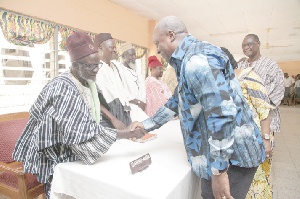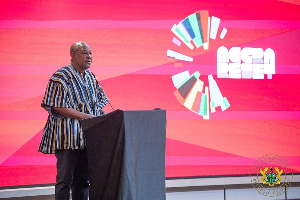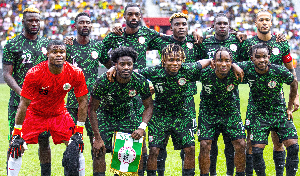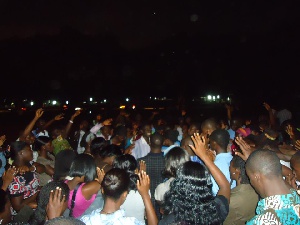A video documentary reportedly premiered recently by the Chaka-Orleans Foundation to foster peace in Bawku ironically has intensified the protracted ethnic conflict in the area.
Angry eminent chiefs of the Bawku Traditional Council have described the documentary as “a recipe for war” and are asking Ghana to hold the producers responsible for any horrifying outcome of the premiered film.
Starr News has gathered that the Chaka-Orleans Foundation produced a documentary about Naa Gbewaa, the ancestor of the Kusasi, the Mamprusi, the Dagomba and the Nanumba ethnic groups.
The producers of the documentary, according to the Bawku Traditional Council, showed open bias by allotting more time to Mamprusi leaders than was given to the personalities from the Kusasi side.
The council also accused the foundation of ignoring the custodians of the Gbewaa Shrine at Pusiga (the capital of the pre-colonial kingdom established by Naa Gbewaa) in the making of the film and also embarrassing the chiefs from the Kusaug Kingdom (the Kusasi Empire) who witnessed the premiering on Friday February 26, 2016, in Tamale, capital of the Northern region.
Distinguished chiefs of the area told journalists Friday at Bawku during a news conference that they did not realise the alleged bias and some historical errors in the film until they were invited to witness the premiering. The news conference was at the instance of the paramount ruler of the Bawku Traditional Area, Naba Asigri Abugrago Azoka II.
The high turnout of chiefs and residents who thronged the paramount palace, venue for the conference, probably mirrors the depth of rage and tension the film has reignited in a municipality still recovering from an ethnic dissention that saw 182 people killed, more than 80 houses torched and several people injured between 2007 and 2012, according to the Bawku Inter-Ethnic Peace Committee (BIEPC).
“Someone also was introduced as Regent of Bawku. In traditional terms, when you have a sitting chief, the regent ceases to function as such. He could have gone in his personal capacity but not as Regent of Bawku. That constitutes an affront on the paramountcy. Once there is a paramount chief, nobody can pose as Regent of Bawku. When they (Mamprusis) went to Tamale, their position as regent was recognised; whereas that is wrong. They interviewed Bawku Naba. He spoke at length. Only a portion was covered. They interviewed Pusiga Naba.
He spoke at length. It was abridged. But they allowed the other side to speak plenty, plenty. If you had the chance of watching the video, you would see Iddi Wuni speaking plenty, plenty, Akalifa speaking plenty. There was no fair play,” Thomas Abilla, Secretary to the council, narrated.
Security agencies failed to crosscheck ? Chiefs
Whilst some of the enraged traditional leaders described the documentary as “a recipe for war”, a number of them heaped the blame on the security agencies for reportedly allowing the film to be premiered without crosschecking its contents.
“It’s a recipe for confusion, for war. It has to be retracted. And it can bring conflict. That is why we are telling the nation that they should be aware of these unscrupulous people parading themselves around that they are documenting something for the future. They are trying to create war for the future,” the Chief of Binaba, Naba Akolburi Abaare IV, growled.
The Chief of Binduri, Naba Robert Akolbila, warned: “If anything happens, they (producers of the documentary) should be held responsible. And maybe the Northern regional security also needs to be blamed because any programme that is taking place in any region has to be crosschecked. If the programme is inimical to development, it’s a recipe for riot, it has to be checked and corrected.”
The film, in the words of the Chief of Kusanaba, Naba Atia Ayarim II, was a “badly done concept” not meant to unite the Gbewaa Family but to disintegrate the people “because they started talking about people who became chiefs politically and all those stuffs to bring problems”.
Regional Minister calls for calm
Meanwhile, the Upper East Regional Minister, Albert Abongo, who doubles as Chairman of the Regional Security Council (REGSEC), has appealed for calm in the area. He also has entreated the makers of the documentary to either withdraw the film or come up with a remake to avert the looming chaos.
“We would call for the withdrawal of this documentary and for the producers to re-examine it and to come out to apologise if they find that the documentary indeed had touched on the sensibilities of some ethnic groups in the Upper East and Northern regions. I say so because my understanding is that the documentary was not fully played because it could not roll out fully at a SADA (Savannah Accelerated Development Authority) programme in Tamale. I will urge the people of Bawku through the Traditional Authority, the Bawku Naba, to remain calm whilst we take up the matter within SADA and within our region,” the Regional Minister appealed.
General News of Saturday, 19 March 2016
Source: starrfmonline.com













